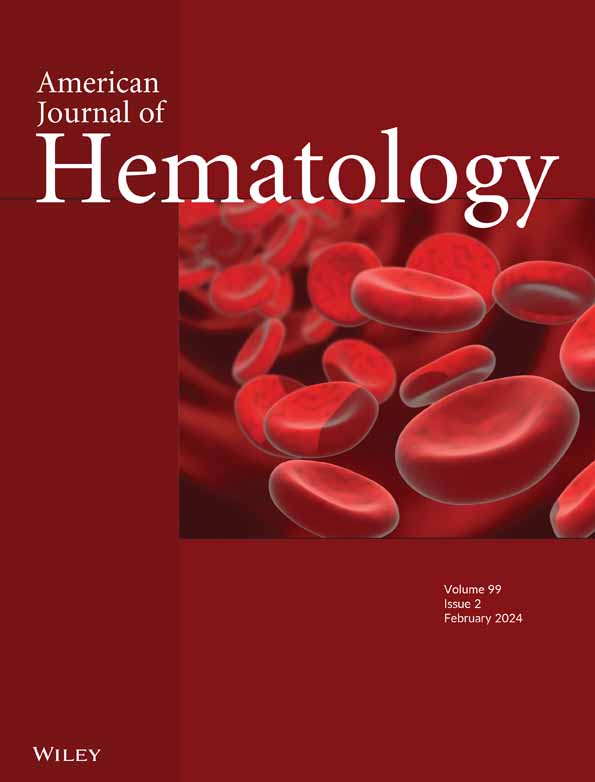供体类型对骨髓纤维化异基因造血细胞移植后预后的影响:代表EBMT慢性恶性肿瘤工作组的研究
IF 9.9
1区 医学
Q1 HEMATOLOGY
引用次数: 0
摘要
选择最佳供体对于优化同种异体造血细胞移植(allo‐HCT)的结果至关重要。我们分析了2015年至2021年间在EBMT中心首次接受同种异体HCT治疗的2809名骨髓纤维化(MF)患者的供体类型的结果。研究结果包括总生存期(OS)、无进展生存期(PFS)、复发、非复发死亡率(NRM)、移植物和移植物抗宿主病(GvHD)。比较四组:兄弟姐妹匹配供体(MSD, n = 742)、非亲属匹配供体(MUD, n = 1401)、非亲属不匹配供体(MMUD, n = 379)和单倍体相同供体(HD, n = 287)。中位随访33.5个月后,MSD、MUD、MMUD和HD的3年OS率分别为65.8%、61.5%、53.2%和57.7%。多变量分析(以MSD为参考)显示,供体类型与OS (MMUD的HR: 1.63, HD的HR: 1.42)、PFS (MMUD的HR: 1.38)、NRM (MMUD的HR: 1.73, HD的HR: 1.47)、移植(MMUD的HR: 0.72, HD的HR: 0.40)、2-4级急性GvHD (MUD的HR: 1.53, MMUD的HR: 1.69, HD的HR: 1.49)和广泛的慢性GvHD (MUD的HR: 0.77, HD的HR: 0.65)显著相关。供体类型与复发风险无关。在60岁以上的患者中,供体类型和结果之间的相关性与总体研究人群一致。总之,在目前的实践中,MF患者接受MSD或MUD移植的效果相当。相比之下,MMUD和HD移植由于NRM增加而有更差的OS。MMUD移植比HD移植有更高的GvHD风险,但这种差异似乎在移植后环磷酰胺消失。本文章由计算机程序翻译,如有差异,请以英文原文为准。
Impact of Donor Type on Outcomes After Allogeneic Hematopoietic Cell Transplantation in Myelofibrosis: A Study on Behalf of the Chronic Malignancies Working Party of the EBMT
Selecting the optimal donor is crucial for optimizing results of allogeneic hematopoietic cell transplantation (allo‐HCT). We analyzed outcomes based on donor type in 2809 myelofibrosis (MF) patients undergoing first allo‐HCT between 2015 and 2021 at EBMT centers. Study outcomes included overall survival (OS), progression‐free survival (PFS), relapse, non‐relapse mortality (NRM), engraftment, and graft‐versus‐host disease (GvHD). Four groups were compared: matched sibling donor (MSD, n = 742), matched unrelated donor (MUD, n = 1401), mismatched unrelated donor (MMUD, n = 379) and haploidentical donor (HD, n = 287). After a median follow‐up of 33.5 months, 3‐year OS rates were 65.8%, 61.5%, 53.2%, and 57.7% for MSD, MUD, MMUD, and HD, respectively. Multivariable analyses (MSD as reference) showed that donor type significantly correlated with OS (HR: 1.63 for MMUD, HR: 1.42 for HD), PFS (HR: 1.38 for MMUD), NRM (HR: 1.73 for MMUD, HR: 1.47 for HD), engraftment (HR: 0.72 for MMUD, HR: 0.40 for HD), grade 2–4 acute GvHD (HR: 1.53 for MUD, HR: 1.69 for MMUD, HR: 1.49 for HD), and extensive chronic GvHD (HR: 0.77 for MUD, HR: 0.65 for HD). Donor type was not associated with relapse risk. In patients over 60 years, correlations between donor type and outcomes were consistent with those in the overall study population. In summary, with current practices, MF patients receiving MSD or MUD grafts achieve comparable outcomes. In contrast, MMUD and HD transplants have worse OS due to increased NRM. MMUD transplants have a higher risk of GvHD than HD transplants, but this difference seems to disappear with post‐transplant cyclophosphamide.
求助全文
通过发布文献求助,成功后即可免费获取论文全文。
去求助
来源期刊
CiteScore
15.70
自引率
3.90%
发文量
363
审稿时长
3-6 weeks
期刊介绍:
The American Journal of Hematology offers extensive coverage of experimental and clinical aspects of blood diseases in humans and animal models. The journal publishes original contributions in both non-malignant and malignant hematological diseases, encompassing clinical and basic studies in areas such as hemostasis, thrombosis, immunology, blood banking, and stem cell biology. Clinical translational reports highlighting innovative therapeutic approaches for the diagnosis and treatment of hematological diseases are actively encouraged.The American Journal of Hematology features regular original laboratory and clinical research articles, brief research reports, critical reviews, images in hematology, as well as letters and correspondence.

 求助内容:
求助内容: 应助结果提醒方式:
应助结果提醒方式:


